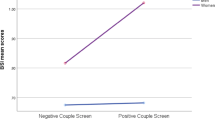Abstract
In this study, undergraduates (n = 473) were asked to envision that their romantic partner was seeing a psychotherapist individually, and were then asked to rate their distress in response to 16 different descriptions of the context of the psychotherapy. Results indicated that overall, participants felt slightly distressed about their partners being in therapy. All contextual variables examined significantly influenced distress ratings. Distress reached moderate to high levels when clients refused to discuss therapy with partners, partners were unaware of the reason for therapy, clients were physically attracted to therapists, or therapy was long. Implications of these results are discussed.
Similar content being viewed by others

REFERENCES
Brody, E. M. & Farber, B. A. (1989). Effects of psychotherapy on significant others. Professional Psychology: Research and Practice, 20, 116-122.
Buss, D. M., Larsen, R. J., Westen, D., & Semmelroth, J. (1992). Sex differences in jealousy: Evolution, physiology, and psychology. Psychological Science, 3251-255.
Dickes, R. & Strauss, D. (1980). Adverse reaction of the apparently healthy parnter in response to improvement in the overtly dysfunctional partner. Journal of Sex and Marital Therapy, 6109-115.
Emmelkamp, P. M. G. & Gerlsma, C. (1994). Marital functioning and the anxiety disorders. Behavior Therapy, 25, 407-429.
Fisher, S. & Mendell, D. (1958). The spread of psychotherapeutic effects from the patient to his family group. Psychiatry, 21, 133-140.
Fox, R. E. (1968). The effect of psychotherapy on the spouse. Family Process, 77-16.
Glasser, P.H. (1963). Changes in family equilibrium during psychotherapy. Family Process, 2245-264.
Hatcher, S. L. & Hatcher, R. L. (1983). Set a place for Elijah: Problems of the spouses and parents of psychotherapy patients. Psychotherapy: Theory, Research, and Practice, 20, 75-80.
Hunsley, J. & Lee, C. M. (1995). The marital effects of individually oriented psychotherapy: Is there evidence for the deterioration hypothesis? Clinical Psychology Review, 15, 1-22.
Hurvitz, N. (1967). Marital problems following psychotherapy with one spouse. Journal of Consulting and Clinical Psychology, 31, 38-47.
Koch, A. & Ingram, T. (1985). The treatment of borderline personality disorder within a distressed relationship. Journal of Marital and Family Therapy, 11, 373-380.
Lefebvre, M. & Hunsley, J. (1994). Couples' accounts of the effects of individual psychotherapy. Psychotherapy, 31, 183-189.
Moran, M. L. (1954). Some emotional responses of patients' husbands to the psychotherapeutic course as indicated in interviews with a psychiatric caseworker. American Journal of Orthopsychiatry, 24, 317-325.
Phillips, B. J. (1983). Some ethical concerns regarding the individual psychotherapy of the married client. Canadian Psychology, 24, 8-13.
Roberts, J. (1996). Perceptions of the significant other of the effects of psychodynamic psychotherapy. British Journal of Psychiatry, 168, 87-93.
Rohrbaugh, M. & Shean, G. D. (1987). Anxiety disorders: An interactional view of agoraphobia. Journal of Psychotherapy and the Family, 365-85.
Segraves, R. T. (1986). Implications of the behavioral sex therapies for psychoanalytic theory and practice: Intrapsychic sequelae of symptom removal in the patient and spouse. Journal of the American Academy of Psychoanalysis, 14, 485-493.
Author information
Authors and Affiliations
Rights and permissions
About this article
Cite this article
Pomerantz, A.M., Seely, E.A. Under What Conditions Is Individual Psychotherapy Distressing to Clients' Romantic Partners? An Empirical Analogue Study. Journal of Contemporary Psychotherapy 30, 255–260 (2000). https://doi.org/10.1023/A:1004190615611
Issue Date:
DOI: https://doi.org/10.1023/A:1004190615611


